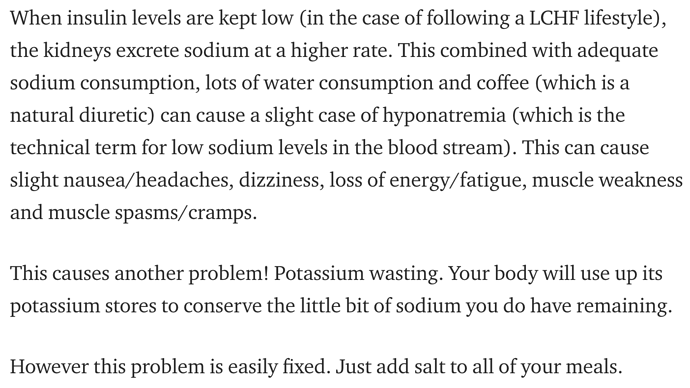This recently appeared in Scientific American and alarmed me a bit because I’ve read on here to increase our salt intake. At what point is it too much and is there anyway to know before it start causing problems if this is in fact accurate? Do people have rebuttals they can offer? https://www.scientificamerican.com/article/a-new-connection-between-the-gut-and-brain1/?fbclid=IwAR2UVzlNDfaF3rU14wxtRzWNKtYcNqkgGNJ0GiGW8m7NtsOybt8F1hGaHOA
On Salt
Context matters. The author of the SA article doesn’t identify which type of diet, but only says “high salt diets.” Generally, we infer they mean dietary variants of the Standard American Diet, which is high in salt. Think back to what you ate, and what marvelous carriers of salt starches are. Take those starches and candies away, and you’re at a lower baseline of salt intake.
FWIW, after my visit with Dr. Westman last week, he suggested I increase my salt. I have, and I can feel the positive difference in many respects.
I wish I could access the studies they refer to but unfortunately without a very expensive subscription I cannot. I just get to read the abstracts. I hoping someone here has got such a subscription to these services and can report back!
None of the studies are in humans. Mice probably make a terrible model animal for considerations of human nutrition. We use them because we have tons of genetic mouse lines to choose from and because their lifespan is short but that doesn’t make them a suitable proxy.
Before LCHF, I don’t know. I was carefully tracking what I ate, I could look it up in MFP, but I wouldn’t trust the data.
Before my Westman visit, I basically stopped adding any salt to my meals. Now, I’m adding a tsp or 2 to my lunch and dinner. I don’t eat breakfast.
I suppose 1 - 2 tsp a day.
It’s estimated that the average Japanese person consumes 2x more salt than the average person in the UK or US. Many drink sake and smoke, yet they have one of the highest average longevities in the world. Japanese live an average of 87 years. US citizens average 78 years and UK averages 81 years. Certainly there are other factors at play and most likely it’s what people are putting their salt on; not the salt itself.
Many studies are often biased and many times studies that show salt is beneficial are largely ingnored. Dr Fung has a very interesting video on the subject where he makes reference to biased studies as well as studies that show the benefits of not reducing salt.
Keep in mind that the article was mostly likely referring to table salt which really isnt salt at all.
I know In all the research I’ve done (and still do) I have come across many articles that mention pretty much the same thing when it comes to salt… That when on a LCHF diet, the body becomes very efficient at excreting sodium, therefore one must make sure to add salt into their meals. And that supplementing Sodium is a much needed regimen. … A quick search just now showed this article, and here is a segment just from the first part.
Here is the full article, if anyone’s interested… But there are many other that will mimic this one.
The difference is on a ketogenic diet you flush a lot of sodium from the body, on a standard diet (SAD) you don’t; so eating the extra salt was not necessary. If you have time to watch these two videos by Dr Stephen Phinney he goes into detail about sodium requirements among other minerals and why you need to replenish them. As @Digital_Dave mentioned, on keto the kidneys become super efficient at excreting sodium from our body so we need to supplement daily.
I’ve actually watched these, and believe? there may even be a total of 3 I watched? … But’s it’s been a while, so I could be wrong?
I’ve been doing keto for 8 months and see a pattern. Even though I posted earlier that I was eating way too much salt to begin with, and tapered off - here is what I have discovered about my body. I would say that I am keto strict 95 percent of the time. A glass of milk here, a tamale there. Every day I drink about eight to ten glasses of water. But, a day after extra eating carbs, the peeing goes on all day long - it won’t stop. It’s like the original water weight you lose on keto when you cut the carbs. I stay in ketosis, but there are days when my body is totally getting rid of water, even though I have not consumed more. On those days, I add in more salt. This I know was long-winded, hope it makes sense.
Watch this video by Andrew Mente, lead investigator on the PURE study, out of McMaster University in Canada. His team, as well as a few other studies that he mentions, found that human beings need 5 g/day of sodium for optimal health, which translates to 12.5 grams of NaCl (table salt).
Yeah there’s only three in that series, “Dr Phinney’s Introduction to Nutritional Ketosis” but I have more from VIRTA that I’d like to check out and they also have that complete series Filmed at the Emerging Science of Carbohydrate Restriction and Nutritional Ketosis, Scientific Sessions at The Ohio State University in October. A lot of hours to listen to but they are totally worth it.
Here’s a complete playlist of VIRTA health videos:

